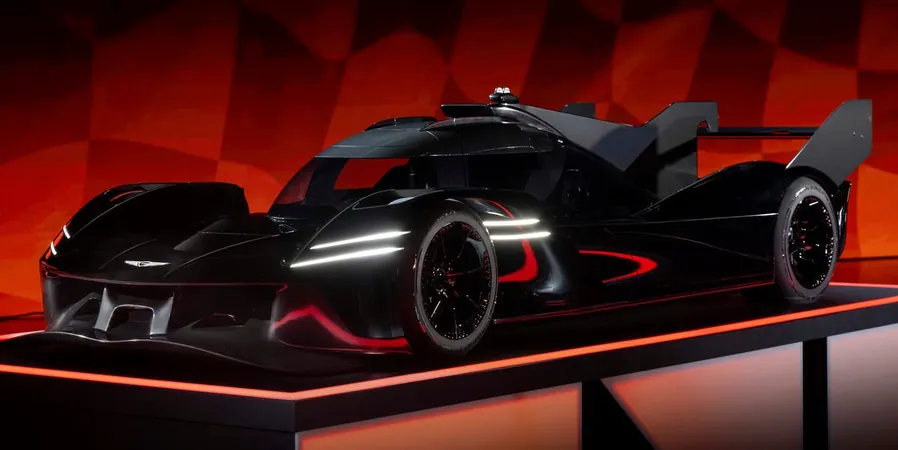
Genesis Sets Its Sights High: Racing Aspirations for Le Mans 2026
2024-12-26
Author: Wei
Genesis Sets Its Sights High: Racing Aspirations for Le Mans 2026
In an ambitious move to assert itself on the global motorsport stage, luxury automotive brand Genesis has unveiled its intent to not only compete but aim for victory at the iconic 24 Hours of Le Mans in 2026. Their vehicle, the GMR-001, made its debut as a half-scale model earlier this month, signaling a race against time to develop a fully competitive LMDh prototype within a tight 14-month timeline.
This initiative represents the most daring motorsport venture in Hyundai Motor Company's 50-year history, a marked shift from the automotive landscape of just a decade ago when Hyundai had no racing pedigree, and Genesis was yet to be born. Since then, Hyundai has made significant strides by participating in the World Rally Championship and introducing the performance-focused N-series, which laid the groundwork for Genesis's emergence as a standalone luxury brand.
Hyundai’s racing chief, Cyril Abiteboul, has embarked on this project with high stakes, as Genesis aims to clinch its first marquee racing trophy. Dubbed “hyperspeed,” the program reflects the brand's urgency to establish a competitive presence before the 2026 season kicks off. A noteworthy example of this urgency is seen in the swift decision-making process; approval for the racing program came just three days after the initial proposal was made.
A key player in this endeavor is Luc Donckerwolke, who has championed the brand’s motorsports ambitions since taking the helm of Genesis in 2015. Earlier this year, he brought Abiteboul onboard, promoting him to President of Hyundai Motorsport. The GMR-001's development has quickly accelerated thanks to a nimble strategy that includes utilizing a uniquely engineered V-8 engine created by merging two four-cylinder engines from Hyundai's rally lineup, a shortcut to meet the project’s tight deadlines. This mirrors a similar approach taken by brands like BMW and Porsche by utilizing adapted engines from other racing formats.
To ensure a robust entry into the competitive world of endurance racing, Genesis has allied with Oreca, their chassis partner. Oreca has a proven track record, with its chassis being the backbone of successful racing programs for names like Acura and Alpine, reinforcing confidence in the GMR-001's performance potential.
Design-wise, the GMR-001 aims to blend performance with aesthetic appeal, drawing inspiration from Genesis's design heritage, while prioritizing purely performance-driven features. Donckerwolke has emphasized the philosophy that performance goals should not be compromised by styling, drawing parallels between racing design and the company’s other automotive projects.
In a notable strategic departure from standard practice, Genesis has opted to develop its factory team, Genesis Magma Racing, independently rather than partnering with existing teams. This decision to forge its own path mirrors Toyota’s successful racing model and will require an elite team of skilled professionals, a challenge being addressed with the recruitment of top-tier talent.
Jacky Ickx, a six-time Le Mans champion, has joined the ranks as an advisor for the GMR project, underscoring the importance of teamwork in racing success. Ickx noted that behind every winning car are countless individuals whose collaboration and commitment are essential to achieving victory.
Genesis has made its first significant driver signings, including Pipo Derani and Andre Lotterer, both esteemed racers with LMDh experience. In line with its development strategy, Genesis introduces a "Trajectory Program," collaborating with IDEC Sport to field an LMP2 car next year, aiming to groom emerging talents like American F1 driver Logan Sargeant and IndyCar standout Jamie Chadwick.
Historically, breaking into the Le Mans racing elite poses formidable challenges; only three non-European manufacturers have ever triumphed, with South Korea's entry marking a revolutionary first. Donckerwolke perceives a victory at Le Mans not just as a sporting achievement but as a transformative moment for Genesis that could enhance its brand image and elevate its corporate identity to new heights.
As preparations intensify for the 2026 season, the key question remains: Can Genesis assemble its team and technology in time to make a significant impact on the hallowed grounds of Le Mans? With a bold vision driving the project, all eyes will be on the GMR-001 and Genesis Magma Racing as they strive against the clock—and history—to carve out a successful future in motorsport. Keep watching; the race has only just begun!




 Brasil (PT)
Brasil (PT)
 Canada (EN)
Canada (EN)
 Chile (ES)
Chile (ES)
 España (ES)
España (ES)
 France (FR)
France (FR)
 Hong Kong (EN)
Hong Kong (EN)
 Italia (IT)
Italia (IT)
 日本 (JA)
日本 (JA)
 Magyarország (HU)
Magyarország (HU)
 Norge (NO)
Norge (NO)
 Polska (PL)
Polska (PL)
 Schweiz (DE)
Schweiz (DE)
 Singapore (EN)
Singapore (EN)
 Sverige (SV)
Sverige (SV)
 Suomi (FI)
Suomi (FI)
 Türkiye (TR)
Türkiye (TR)